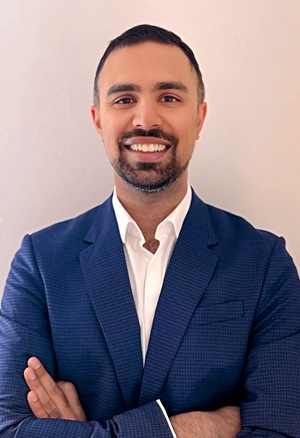2025 | Volume 26 | Issue 2

Dr Ashraf Tokhi
Dr Ashraf Tokhi received the RACS Learning and Development Grant in 2024 as part of the Bongiorno National Network Younger Fellows Travel Grant. He used to the grant money to pursue an Upper Gastrointestinal (GI) Clinical Fellowship at Nottingham Hospital in the UK—one of the largest centres for oesophageal and gastric cancer surgery.
“I have been fortunate to gain exposure to variety of cases but the volume of cancer cases has deepened my interest in the disease’s management and understanding the complexities. It’s a fairly morbid disease, and the nuances of its treatment are crucial,” Dr Tokhi says.
Fellowship experience: Expanding skills and knowledge
From January last year, during his time in the UK, Dr Tokhi has developed expertise in endoscopic cancer management. This is a minimally invasive approach that reduces the need for traditional surgery and lowers patient morbidity.
“Due to the UK’s dense population and the National Health Service (NHS) being stretched means only a few specialised centres handle cancer cases. Nottingham is one of them, performing around 130 cancer operations annually, and provides an excellent learning environment for specialists in training.”
“Working in a high-volume unit has been invaluable. It has given me deeper insights into the disease, management techniques, and the expertise of experienced surgeons and allied health staff,” he says.
In addition to endoscopic management, Dr Tokhi has trained in robotic surgery, an area expected to grow significantly in Australia over the next decade. “Robotic practice in Australia is expanding, and I’m confident it will continue to grow—especially in my field—over the next 10 years. This will enable us to offer patients procedures that are less invasive than traditional surgeries.”
Another benefit of Dr Tokhi’s Fellowship has been building strong connections between the UK and Australian centres. “These international relationships are valuable for future research, training the next generation of surgeons, and advancing cancer care on a global scale,” he says
Having completed his Fellowship, Dr Tokhi is extending his stay to further develop expertise in endoscopic treatment for early cancers. “These techniques remove cancers and pre-cancerous lesions with less invasive methods, providing an alternative to traditional surgery.
“I’m excited to bring these skills back to Australia.”
A passion for Upper GI Surgery
Born in Australia, Dr Tokhi completed his medical training at the University of Melbourne, followed by surgical training at the Austin Hospital and the Royal Melbourne Hospital.
His interest in general surgery was sparked by its holistic approach to patient care and the variety of surgical opportunities. “As a junior doctor, I had excellent mentors who inspired me and gave me the confidence to pursue this path.”
During his training, he undertook a master’s program at the Peter MacCallum Cancer Centre in Melbourne. Here, he developed a keen interest in upper GI cancer surgery, leading him to specialise in oesophageal and gastric surgery.
“It’s a field that deals with significant morbidity, both in benign and malignant cases, but also offers the chance to make a real difference in people’s lives. We’re improving cancer treatments, but there’s still much to be done.”
The role of the RACS Grant
“I’m very appreciative of the support I received from the grant. Moving to the UK was a big step for me. The support from the grant was crucial in setting me up initially and took a huge weight off my shoulders,” Dr Tokhi says.
He encourages aspiring surgeons to pursue opportunities for international training and development. “Don’t hesitate to push yourself and try something new. The support is there, and the experience is invaluable.”
Beyond medicine
Dr Tokhi enjoys golf, cycling, and tennis. He and his partner have embraced their time in the UK. With Europe at their doorstep, they have taken every opportunity to travel and experience different cultures.
While he misses his dog back in Australia, he has made the most of his international experience—balancing work with exploration and personal growth.